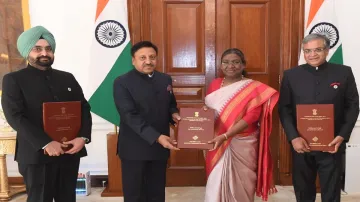Lok Sabha Election Results 2024: The Election Commission of India (ECI) today (June 6) submitted the names of the members elected to the 18th Lok Sabha to President Droupadi Murmu. Chief Election Commissioner Rajiv Kumar, along with the Election Commissioners Gyanesh Kumar and Sukhbir Singh Sandhu, met the President and submitted to her a copy of the notification issued by the ECI, in terms of Section 73 of the Representation of People Act, 1951, containing the names of the Members elected to the Lok Sabha following the general elections.
At the occasion, the President congratulated the CEC and the Election Commissioners on the successful completion of the electoral process.
"On behalf of the entire country, she appreciated the efforts of the Election Commission, its officials and members of staff, other public officials who were involved in management and superintendence of the campaign and polling, and police and security personnel, Central and State, for working tirelessly and diligently to uphold the sanctity of the people’s ballot and successfully completing a free and fair election," the President’s Secretariat said.
MCC lifted in India
In a related development, with the declaration of the results, the ECI lifted the Model Code of Conduct (MCC), which was imposed on March 16. The provisions of MCC are enforced from the date of announcement of the election schedule by the Election Commission and it remains in operation till the completion of the election process.
On Wednesday, the President dissolved the 17th Lok Sabha with immediate effect on the advice of Prime Minister Narendra Modi-led Cabinet. Its term was due to end on June 16.
The voting period for the 2024 Lok Sabha polls, spread over 44 days, was the second longest after the first parliamentary elections of 1951-52 which lasted for more than four months. The total number of days of the electoral process this time, from the announcement of the polls by the Election Commission on March 16 till the counting of votes on June 4, was 82. Polling in the world's biggest election exercise was held in seven phases beginning on April 19.
Know more about model code of conduct
The model code of conduct is a set of conventions agreed upon by all stakeholders and imposed during elections. Its objective is to keep the campaigning, polling and counting process orderly, clean and peaceful and check any abuse of state machinery and finances by the party in power.
While poll code does not enjoy any statutory backing, the Supreme Court has upheld its sanctity on several occasions. The Election Commission is fully authorised to investigate any violation of the code and pronounce punishment.
The poll code finds its origin during the 1960 assembly elections in Kerala when the administration tried to evolve a code of conduct for the political parties. The code has evolved over the last 60 years to assume its present form.
ALSO READ: 'Jailed MPs can come to Parliament with permission of courts', says Ex-Lok Sabha Secretary General
ALSO READ: Delhi court seeks NIA's response on Engineer Rashid's interim bail plea to take oath as Lok Sabha MP
Latest India News
